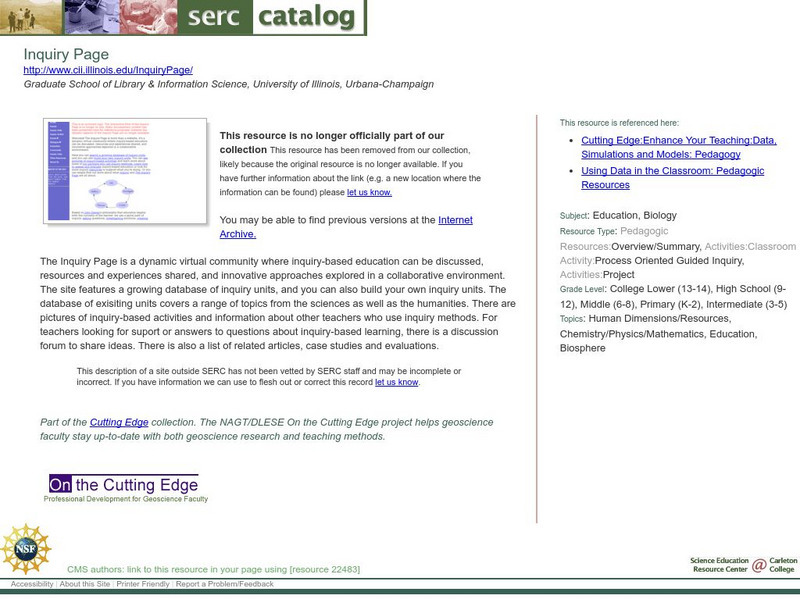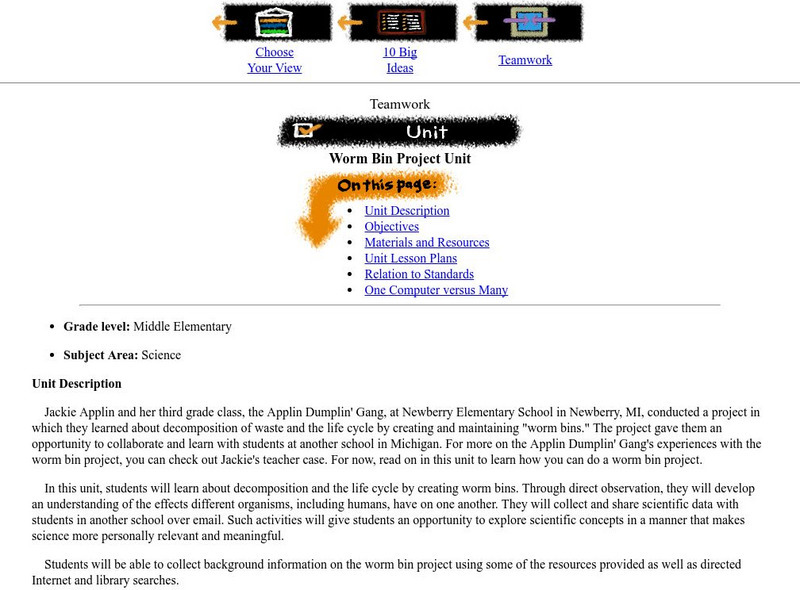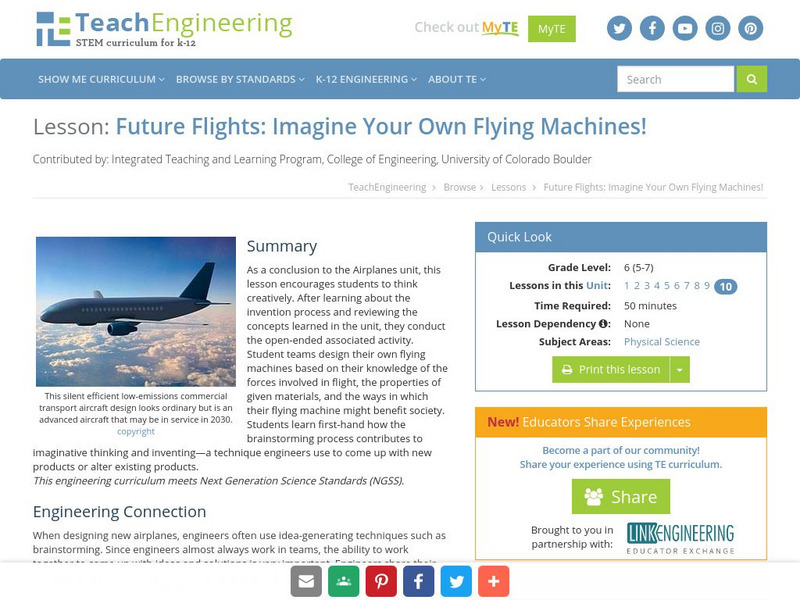Curated OER
Time is On My Side!
Fourth graders review the most effective test taking and studying skills. As a class, they are introduced to how to self-manage themselves when it comes to the activities they have to complete. To end the lesson, they complete a pretend...
Cengage Learning
Investigating Social Change: Midwest
Explore the evolution of the Midwest region of the United States. Students and teachers will gain a different perspective about the Midwest when they check out this site.
Science Education Resource Center at Carleton College
Serc: Inquiry Page
An on-line community that uses inquiry-based and collaborative approaches to study inquiry-based learning. Features a database of inquiry units covering a wide range of topics, or you can also build your own inquiry units.
Alabama Learning Exchange
Alex: Gossip to Learn: A Juicy Approach to Research
Though teachers might use this student-centered, technology-based, one or two-day research project to introduce any author, English 12 teachers may wish to use the lesson plan to jump-start a unit on British literature from the Romantic...
Science Education Resource Center at Carleton College
Serc: The Heat Is On: Understanding Local Climate Change
A lesson unit where young scholars analyze long-term weather data for Phoenix to look for changes that have occurred over time. They look at factors that would cause climate warming, including greenhouse gases and other phenomena. They...
Alabama Learning Exchange
Alex: Extra, Extra!! Mary Rowlandson's Captivity Newscast
This lesson will be an interdisciplinary lesson that involves both English Language Arts and Social Studies (History). The lesson will be primarily technology-based and also project-based that will have the young scholars performing...
Alabama Learning Exchange
Alex: Telling Time to the Hour
This lesson plan helps children make a connection between the digital and analog clock. In general, the number system is based on units of ten which can sometimes make it difficult for children to realize that time is based on cycles of...
Alabama Learning Exchange
Alex: The Circles of Life
This is an inquiry based cooperative learning unit that can be used in biology as a graduation exam review or in botany for a nine week project. The students will learn the life cycle of mosses, ferns, gymnosperms and angiosperms. The...
Alabama Learning Exchange
Alex: Plan the Adventure of a Lifetime With Lewis and Clark
This plan is the first lesson in my unit on Lewis and Clark. This is a project-based, hands-on unit in which students "become" part of the Corps of Discovery - the members traveling in the Lewis and Clark Expedition. In this lesson, the...
Alabama Learning Exchange
Alex: Native Cultures in the Americas
This activity is part of a project-based, hands-on unit in which children discover the native cultures that existed in the Americas prior to the arrival of explorers. The students will "become" part of their assigned culture through...
Alabama Learning Exchange
Alex: Taking Apart and Reconstructing Stories
This lesson is designed as a project-based unit plan that will take students through the narrative process from deconstruction to construction. After initial discussion, students will use the Interactive Story Map feature at Read Write...
Alabama Learning Exchange
Alex: Native Cultures vs. Explorers in World Court
This lesson represents the end result of a project-based, hands-on unit in which children represent a culture they've researched in a World Court Hearing against the explorers they encountered.
Alabama Learning Exchange
Alex: Hail to the Chief!
The students will use prior knowledge of Presidents to complete this project. They will devise a platform based on past presidents' qualities and their impact on the nation to run against classmates in an election. Students will use this...
Michigan State University
Michigan State University: Lets Net: Worm Bin Project Unit
Students learn about the worm life cycle and decomposition of life by creating small-scale worm ecosystems. Research groups share scientific data with groups at other schools using web-based communication tools.
TeachEngineering
Teach Engineering: Future Flights!
This activity is an exciting conclusion to the airplanes unit that encourages students to think creatively. After a review of the concepts learned, students will design their own flying machine based on their knowledge of the forces...
Alabama Learning Exchange
Alex: University and College Tuition Webquest
This is a technology-based and interdisciplinary project incorporating mathematics, language, and technology standards. Each student will research on the university's website: location, the mission statement, historical and interesting...
Alabama Learning Exchange
Alex: Where Did You Get Those "Jeans"?
This lesson plan can be interdisciplinary involving science, mathematics, and language arts. The primary nature of the lesson plan is inquiry, project, and technology-based. In science this project is a culminating activity in the...
Alabama Learning Exchange
Alex: Souper Scooper
This hands-on, inquiry based lesson plan is an extension of the AMSTI Science Module, Solids and Liquids. Students use nonstandard units to measure beans in a soup mix. Students predict how many beans will be in a scoop. Students group...
Alabama Learning Exchange
Alex: Effective Interview Techniques
The lesson will begin with a lecture on the importance of effective interview techniques. A technology-based project will be assigned for students to use the Internet to gather information and then create either a slideshow presentation,...
Alabama Learning Exchange
Alex: Dream Vacation
This unit teaches learners to plan a trip with an itinerary, remain within a budget, and work cooperatively. It is a technology-based project that combines a study of mathematics, economics, geography, and social studies.
Alabama Learning Exchange
Alex: Pass It Down
This lesson, Pass It Down, integrates science and math into two consecutive hands-on genetics activities that should be embedded within an existing genetics unit suitable for biology young scholars. The results of each activity will be...
Alabama Learning Exchange
Alex: Can You Curl Your Tongue?
This lesson is adapted from a Connected Mathematics Unit, How Likely is It? This investigation introduces biology as a source of applications for probability. In this lesson, Curling your Tongue, students determine how many students in...





















